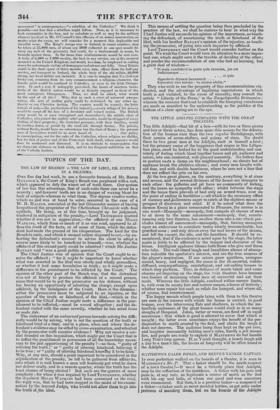THE LAW OF REASON v. THE LAW OF LIBEL, OR
JUSTICE IN A DILEMMA.
TOPICS OF THE DAY.
ONE fine day last week, to use a favourite formula of Mr. Baron HueLocies, the Court of King's Bench was perplexed with a suit, which appeared to defy the wisest set of teeth there. Our system of law has this advantage, that of such suits there can never be a scarcity ; and lawyers' teeth are in no danger of waxing blunt for lack of subjects whereon to whet them. The dignus vindice nodus, which no god was at hand to solve, occurred in the case of a W. H. HALPIN, convicted at the last Gloucester assizes of having bespattered the proprietor of the Cheltenham Chronicle with foul epithets. He being, as at this time, brought up for judgment, tendered in mitigation of the penalty,—Lord TENTERDEN queried whether it was not in aggravation,—the affidavit of one MILES W.ATKINS, which from so much of it as was read, appeared to af- firm the truth of the facts, or of some of them, which the defen- dant had made the ground of his vituperation. The knot for the Bench to untie, and which it seemed rather disposed to cut,—by ex- horting the defendant's counsel to advise his client to adopt a course more likely to be beneficial to himself,—was, whether the affidavit of this second party could be admitted ? which Mr. Justice BAYLEY said "was a great public question." The Chief Justice was of opinion that the Court ought to re- ceive the affidavit ; "for it might be important to know whether what was asserted in the libel was utterly and wholly groundless, or whether it had some foundation in truth ; as it might make a difference in the punishment to be inflicted by the Court." The opinion of the other part of the Bench was, that the defendant was not at liberty to produce the affidavit of a second person, since that would be to put the prosecutor on his defence, without his having an opportunity of rebutting the charge, except upon affidavit, by the indulgence of the Court. Here is the dilemma : either the prosecutor must be subjected to an injustice, or the question of the truth or falsehood, of the libel,—which in the opinion of the Chief Justice might make a difference in the pun- ishment to be inflicted,—must be waved altogether ; and the de- fendant visited with the same severity, whether he has acted bona or mala fide.
The endeavour of an unlearned person towards solving the diffi- culty would be by asking, why is not the question of the truth or falsehood tried at a time, and in a place, when and where the de- fendant's evidence may be sifted by cross-examination, and rebutted by the prosecutor with counter evidence ? Why not receive a ver- dict founded on this inquisition, which might put the Court that is to inflict the punishment in possession of all the knowledge neces- sary to the just apportioning of the penalty ?—as thus, "guilty of uttering the truth ;" or" guilty of uttering falsehood, believing it to be true; or "guilty of uttering falsehood knowng it to be false." Why, at any rate, should a point important to be considered in the adjudication of the penalty, be left to be gathered from affidavits, into which it is well known a man will fearlessly put what he dares not deliver orally, and in a remote quarter, where the truth has the least chance of being elicited ? But such are the queries of mere simplicity ; for when it was inquired by Lord TENTERDEN, whether the deponent MILES WATKINS had been examined on the trial, the reply was, that he had been stopped in the midst of his exami- nation by the learned Judge, who would not allow them to go into the truth of ,the This means of settling the question being thus precluded by the practice of the law, we shall be curious to hear in what way the Chief Justice will reconcile his opinion of the importance, as touch- ing the defendant, of ascertaining the truth or falsehood of the libel, with his brother BAYLEY'S opinion of the injustice, as touch- ing the prosecutor, of going into such inquiries by affidavit.
Lord TENTERDEN said the Court would consider further on the point. We wish'the Court would turn its attention to a more impor- tant one, which might save it the trouble of deciding of the other; and ponder the recommendation of one who had no learning, but a great deal of wisdom- " Si mala condiderit in quem quis carmina, jus eat
Judiciumque . . . . si quis
Opprobriis dignum laceraverit . . .
Solventur risu tabulte : to missus abibis."
They who wish to see the propriety of this recommendation vin- dicated, and the advantage of legalizing imputations in which truth is not violated, to the cause of morality, may consult the article " Liberty of the Press," in the Encyclopedia Britannica ; wherein the reasons that tend to establish the foregoing conclusion are made as manifest to the understanding as the pebbles at the bottom of a clear spring are to the eye.


















 Previous page
Previous page